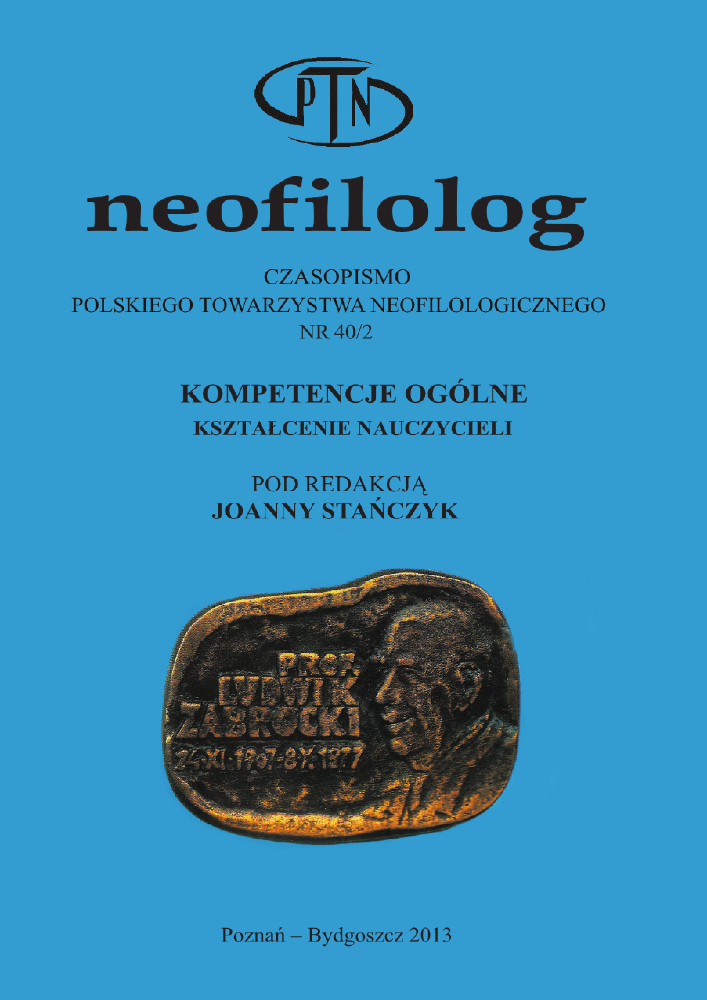Résumé
Artykuł omawia założenia i metodologię badań, przeprowadzonych na reprezentatywnej próbie w szkołach gimnazjalnych w Polsce, których celem było opisanie postaw i poglądów na temat uczenia się i nauczania języków obcych w szkołach. Niezbędne do przeprowadzenia analizy dane zostały zebrane za pomocą kwestionariusza, w którym około 4000 respondentów wyraziło swoje opinie, dotyczące 60 zagadnień, w pięciostopniowej skali Likerta. Niniejszy artykuł prezentuje wybrane wyniki badań.
Références
Abraham, R. and Vann, R. 1987. “Strategies of two language learners: A case study”. In A. Wenden and J. Rubin (Eds.), Learner strategies in language learning Englewood Cliffs, N.J.: Prentice Hall: 85-102.
Barcelos, A. M. F. 1995. A cultura aprender lingua estrangiera (inglěs) de alunos de letras (The culture of learning a foreign language (English) of language students.) Unpublished master’s thesis. UNICAMP, São Paulo, Brazil.
Barcelos, A. M. F. 2003. “Researching beliefs about SLA: A critical review.” In P. Kalaja and A. M. F. Barcelos (Eds.), Beliefs about SLA: New research approaches. Dordrecht: Kluwer Academic Publishers: 7-33.
Csizer, K. and Kormos, J. 2009. “Learning experiences, selves and motivated learning behavior: a comparative analysis of structural models of Hungarian secondary and university learners of English.” In Dörnyei, Z. and Ushioda, E. (eds.) Motivation, Language Identity and the L2 Self. Bristol: Multilingual Matters: 98-119.
Ellis, R. 2008. “Learner beliefs and language learning”. Asian EFL Journal, Vol. 10, No. 4: Conference Proceedings: 7-25.
European Survey on Language Competences 2012. First European Survey on Language Competences. Final Report. European Commission Education and Training.
Flavell, J.H. 1987. “Speculation about the nature and development of metacognition”. In F.E. Weinert, & R.H. Kluwe, (Eds.), Metacognition, motivation and understanding. Hillsdale, NJ: Lawrence Erlbaum: 1-29.
Gardner, R. C. 1985. Social Psychology and Second Language Learning: The Role of Attitudes and Motivation. London: Edward Arnold.
Gardner, R. C. 2004. Attitude Motivation Test Battery. International AMTB Research Project. Downloaded from http://publish.uwo.ca/~gardner/docs/englishamtb.pdf on 4.09.2012.
Gardner, R. C. 2006. “The socio-educational model of second language acquisition: a research paradigm.” In Foster-Cohen, S.H., Medved Krajnović, M. and Mihaljević Djigunović, J. (eds.), EUROSLA Yearbook Vol. 6. Amsterdam: John Benjamins: 237-260.
Hattie, J.A C. 2002. “What are the attributes of excellent teachers?” In Teachers make a difference: What is the research evidence? Wellington: New Zealand Council for Educational Research: 3-26.
Horwitz, E.K. 1987. “Surveying student beliefs about language teaming”. In A.L.
Wenden & J. Robin (Eds.), Learner strategies in language learning. London: Prentice Hall: 119-132.
Horwitz, E.K. 1999. “Cultural and situational influences on foreign language learners’ beliefs about language learning: A Review of BALLI Studies.” [Special Issue]. System, 27: 557-576.
Kalaja, P., Menezes, V. & Barcelos, A-M. (Eds.) 2008. Narratives of learning and teaching EFL. Basingstoke: Palgrave Macmillan.
Masgoret, A-M. and Gardner, R. 2003. “Attitudes, Motivation, and Second Language Learning: A Meta-Analysis of Studies conducted by Gardner and Associates”. In Dörnyei, Z. (ed.) Attitudes, Orientations, and Motivations in Language Learning: Advances in Theory, Research and Applications. Oxford: Blackwell: 167- 210.
Mori, Y. 1999. “Epistemological beliefs and language learning beliefs: What do language learners believe about their learning”. Language Learning, 49: 377-415.
Park, G. P. 1995. Language learning strategies and beliefs about language learning of university students learning English in Korea. Unpublished Doctoral Dissertation. The University of Texas at Austin, TX.
Ryan, M.P. 1984. “Monitoring text comprehension: Individual differences in epistemological standards”. Journal of Educational Psychology, 76 (2): 248-258.
Taguchi, T., Magid, M. and Papi, M. 2009. “The L2 motivational self system among Japanese, Chinese and Iranian learners of English: A comparative study”. In Dörnyei, Z. and Ushioda, E. (eds.) Motivation, Language Identity and the L2 Self. Bristol: Multilingual Matters: 66-97.
Tanaka, K. and Ellis, R. 2003. “Study abroad, language proficiency, and learner beliefs about language learning”. JALT Journal, 25: 63-85.
Victori, M. & Lockhart, W. 1995. “Enhancing metacognition in self-directed language learning”. System, 23(2): 223-234.
Wenden, A. 1986. “What do second language learners know about their language learning? A second look at retrospective accounts”. Applied Linguistics, 7: 186-201.
Wenden, A. 1999. An introduction to metacognitive knowledge and beliefs in language learning: Beyond the basics [Special Issue]. System, 27: 435-441.
Licence
© Neofilolog 2019

Ce travail est disponible sous licence Creative Commons Attribution - Pas de Modification 4.0 International.
Auteurs :
Les auteurs de textes acceptés pour publication dans la revue Neofilolog sont tenus de remplir, signer et renvoyer à l'adresse de la rédaction, un accord sur l'octroi d'une licence gratuite pour les œuvres, avec obligation d'accorder une sous-licence CC.
En vertu de cet accord, les auteurs des textes publiés dans la revue Neofilolog accordent à l'Université Adam Mickiewicz de Poznań une licence non exclusive et gratuite et permettent l'utilisation de la sous-licence Creative Commons Attribution-NoDerivatives 4.0 International (CC BY-ND 4.0).
Les auteurs se réservent le droit de disposer librement de l'œuvre.
Utilisateurs :
Les utilisateurs d'Internet intéressés ont le droit d'utiliser les œuvres publiées à partir de l'année 2017 sous réserve des conditions suivantes :
- reconnaissance de la qualité d'auteur - l'obligation de fournir des informations sur la qualité d'auteur, le titre, la source (liens vers l'œuvre originale, DOI) et la licence, ainsi que l'œuvre distribuée ;
- sans créer d'œuvres dérivées - l'œuvre doit être conservée dans sa forme originale, p. ex. les traductions ou les interprétations ne peuvent être distribuées sans le consentement de l'auteur.
Tous les textes publiés sont soumis au droit d'auteur.
Autres :
L'Université Adam Mickiewicz de Poznań se réserve le droit à la revue dans son ensemble (mise en page, forme graphique, titre, conception de la couverture, logo, etc.).
.
